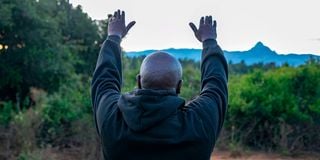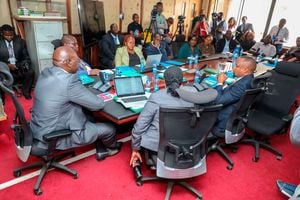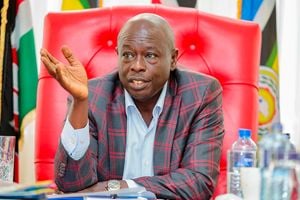Breaking News: Former Lugari MP Cyrus Jirongo dies in a road crash

Deputy President Rigathi Gachagua at Mawingu Trail on the slopes of Mt Kenya on March 18, 2023.
Deputy President Rigathi Gachagua is walking a political tightrope in the restive Mt Kenya region with his fight against illicit brews, leading reforms in the agricultural sector and taking care of the interest of traders in Nairobi’s Nyamakima area.
The undertakings are a litmus test to the former Mathira MP even as he is also perceived to be fighting the shadow of Kiharu MP Ndindi Nyoro, who has been making waves on the political scene in the region and beyond.
Since becoming the DP, Mr Gachagua has been keen on consolidating the region and positioning himself as its kingpin. His critics have often accused him of forgetting his national role and focusing on the region.
Fighting the drinking problem, which has ravaged the region for years, is set to test the DP’s political mettle, setting the stage for a bruising battle with the youth and traders, who form a significant chunk of voters.
Success in his campaign on an issue that has been a headache for years could, however, cast him as a man keen to ensure the region’s well-being.
Leading reforms in the coffee, tea and milk sub-sectors as assigned to him by President William Ruto also presents its fair share of challenges.
While Mr Gachagua’s success in the two fronts will boost his political standing in the region, the opposite will dim his political future.
The DP has vowed not to relent in his resolve to address the alcoholism menace, recounting how he lost his brother to the “bottle”. He has said he is ready to lose his position if that is what it takes.

Deputy President Rigathi Gachagua delivers a public lecture on leadership at Murang’a University of Technology on March 20, 2024.
“When we talk about alcoholism and fighting the menace, it is not politics. We are speaking while experiencing so much pain in our hearts. We know what alcohol abuse has done to us, our neighbours and friends,” he said.
With the alcoholism war taking its toll on businesses in the area, some traders have accused the national government of using the fight to kill legal trade. In Murang’a, for example, bar owners accused the government of fighting their businesses under the guise of eradicating illicit brews.
They said that they have no connection to the producers of second-generation and illicit brews, and that they have continuously been targeted for the wrongs committed by manufacturers. They said over 40 per cent of their businesses have been closed down, rendering over 10,000 workers jobless.
“We have made it very clear that we support the fight against illicit brews but this has become malicious. It is no longer about illicit brews. Some administrators have been harassing women traders and closing their bars after rejecting their advances. It’s unfair,” said the association’s chairperson Simon Njoroge.
Last year, Mr Gachagua directed all county governments within the Mt Kenya region to revoke all the alcohol licences issued to bars and restaurants, saying they should only licence one bar in each town. He attributed the high rate of drug abuse to the unregulated alcohol selling joints.
A few months ago, the DP also ordered a crackdown on the proscribed Mungiki gang. After backlash from the youth who accused him of labelling them Mungiki after hailing them as his “soldiers” during campaigns, the DP went quiet on the issue.
It is not lost on the public that in the Grand Coalition government, President Mwai Kibaki assigned Prime Minister Raila Odinga the task of spearheading Mau Forest restoration. Mr Odinga paid a heavy price as the ensuing evictions from the water catchment area were turned into political fodder, which ultimately cost him the Rift Valley votes and therefore the presidency in 2013.
Political commentator Javas Bigambo avers that “it is incumbent upon him (Mr Gachagua) to perform so that when he is so ambitious that he wants to become a president, his candidature can be based on his success in the task that had been given to him by the President”.
While seeking votes in Mt Kenya, the Kenya Kwanza government promised to revamp tea, coffee and milk sub-sectors, promising farmers a guaranteed minimum return. Former President Uhuru Kenyatta was accused of neglecting farmers and profiting from their woes by buying milk at low prices.
But the same issues that were used to beat the Uhuru camp have returned to haunt the DP. While addressing a coffee reforms summit in Meru in June last year, the DP vowed to crush whoever will stand in his way.

Deputy President Rigathi Gachagua during a past event.
“The reforms that I was tasked to push by President William Ruto in coffee, tea and milk, have started to bear fruit. We got a high bonus this year, which has not been witnessed earlier. We are doing well,” he said, even as he later asked for support and prayers to protect him against those fighting back.
Last year in Othaya, Nyeri County, he urged farmers to be patient because it is not an easy or simple fight. But patience is something some farmers in the region appear to have run out of in recent weeks.
While Mr Gachagua said the Mount Kenya region stands to reap big from the Finance Act 2023, voices of discontent have emerged—especially among avocado farmers—over new tax requirements..
Two Murang’a MPs a few weeks ago joined disgruntled farmers to chase away Kenya Revenue Authority officials who were educating farmers on how to electronically generate and transmit their invoices.
The DP was forced to call a meeting with elected leaders from the region to chart the way forward regarding the ongoing agricultural reforms. As part of the resolution of the meeting, the DP established a stakeholders’ committee to come up with a temporary solution to relieve farmers from the KRA electronic invoice rule.
The committee consists of a representative from the Senate (Kirinyaga Senator James Murango), National Assembly (Tigania West MP John Mutunga), exporters, aggregators, farmers’ representatives, processors, Cabinet secretaries in charge of Trade, Agriculture, Cooperatives and Treasury, and officials from the DP’s office.
“The team will sit together with the Treasury to look into an immediate solution to the impasse. After the meeting, the resolutions will be reflected in the Finance Bill 2024,” said the Kirinyaga senator.
But just like Mr Gachagua, the legislators find themselves in a tight spot, including how to handle the perception that farmers from the region are being treated differently when it comes to taxes.
There is also the third challenge that seems to be bubbling: the influential Nyamakima traders.
During a meting last week, the traders had raised issue with political leaders over brutal city askaris, lack of enough trading spaces as well as harassment by both KRA and the Anti-Counterfeit Authority.
Striking a balance on how to appease the largely Mt Kenya traders and not be seen to be going against Kenya Kwanza policies could present a headache for the DP.
Speaking in Murang'a County on February 23, 2023, Mr Gachagua said that he will act as the guardian angel for Mt Kenya region businesspeople and their enterprises in Nairobi.
The DP said the Nyamakima traders had suffered during Mr Kenyatta’s regime “where government presided over destruction of local importers’ goods in the excuse of fighting counterfeits”. (See side stories)











